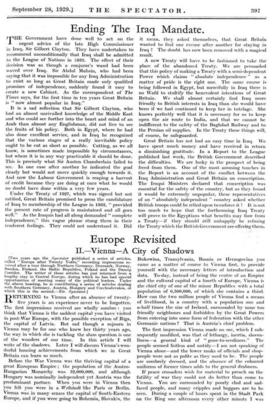Ending The Iraq Mandate.
THE Government have done well to act on the I urgent advice of the late High Commissioner in Iraq, Sir Gilbert Clayton. They have undertaken to recommend unconditionally that Iraq shall be admitted to the League of Nations in 1932. The effect of their decision was as though a conjuror's wand had been waved over Iraq. Sir Abdul Muhsin, who had been saying that it was impossible for any Iraq Administration to exist so long as Great Britain made only qualified promises of independence, suddenly found it easy to create a new Cabinet. As the correspondent of The Times says, for the first time in ten years Great Britain is " now almost popular in Iraq."
It is a sad reflection that Sir Gilbert Clayton, who had an almost unrivalled knowledge of the Middle East and who could see further into the heart and mind of an Arab than almost any Englishman, did not live to see the fruits of his policy. Both in Egypt, where he had also done excellent service, and in Iraq he recognized that the various stages of a really inevitable policy ought to be cut as short as possible. Cutting, as we all know, is sometimes made impossible by circumstances, but where it is in any way practicable it should be done. This is precisely what Sir Austen Chamberlain failed to see. In one case after another he indicated the goal clearly but -would not move quickly enough towards it. And -now the Labour Government is reaping a harvest of credit because they are doing at once what he would no doubt have done within a very few years.
Under the Treaty. of 1927, which was signed but not ratified, Great Britain promised to press the candidature of Iraq to membership of the League in 1932, " provided the present rate of progress is maintained and all goes well." As the Iraquis had all along demanded " complete independence," this vague phrase stung them in their tenderest feelings. They could not understand it. Did it mean, they asked themselves, that Great Britain wanted to find one excuse after another for staying in Iraq ? The doubt has now been removed with a magical result.
A new Treaty will have to be fashioned to take the place of the abandoned Treaty. We are persuaded that this policy of making a Treaty with a semi-dependent Power which claims " absolute independence " as a matter of pride is the right one. The same course is being followed in Egypt, but mercifully in Iraq there is no Wafd to stultify the benevolent intentions of Great Britain. We shall almost certainly find Iraq more friendly to British interests in Iraq than she would have been- if we had continued to keep her in tutelage. She knows perfectly well that it is necessary for us to keep open the air route to India, and that we cannot be indifferent to the safety of the Baghdad Railway and to the Persian oil supplies. In the Treaty these things will, of course, be safeguarded.
Great Britain has not had an easy time in Iraq. We have spent much money and have received in return a diminishing gratitude. In a Report to the League published last week, the British Government described the difficulties. We are lucky in the prospect of being freed from them. One of the most amusing touches in the Report is an account of the conflict between the Iraq Administration and Great Britain on conscription. The Iraqui Ministers declared that conscription was essential for the safety of the country, but as they found it would be extremely unpopular, these representatives of an " absolutely independent " country asked whether British troops could be relied upon to enforce it ! It is not too much to hope that the forthcoming Iraq Treaty will prove to the Egyptians what benefits may flow from a Treaty—if they should still unhappily be refusing the Treaty which the British Government are offering them.


































 Previous page
Previous page